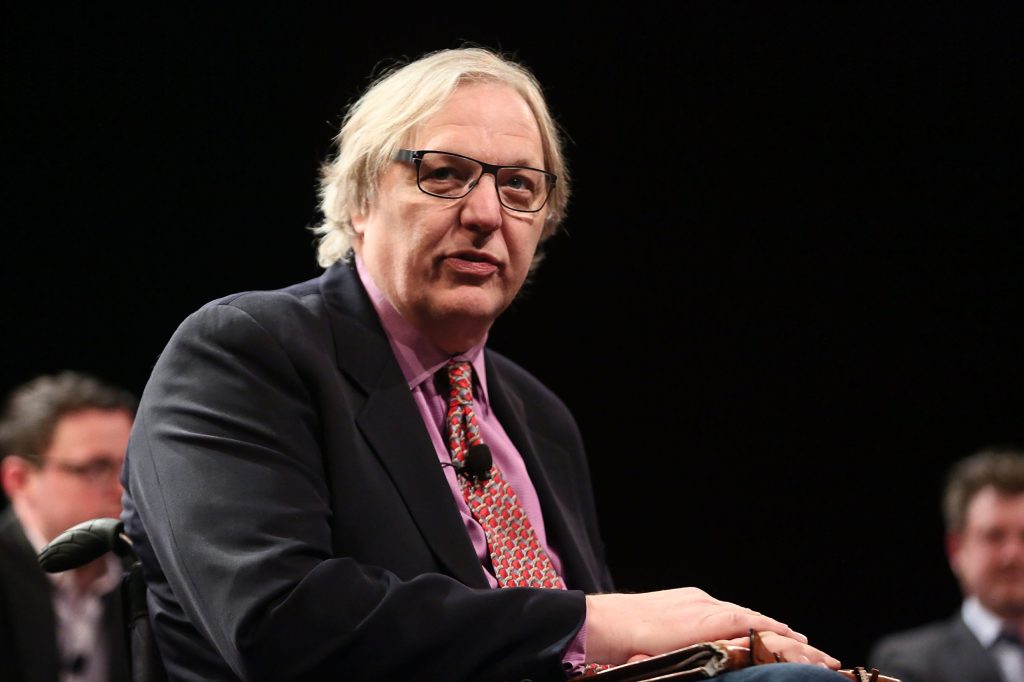‘There are two sides to every story’ is an aphorism you don’t hear often lately. Ask anyone amidst a family row: most stories have more than two sides. But in the take-no-prisoners world of #MeToo, there’s only one side. All women are victims and all women are truthful. Any man who’s had a shadow of doubt cast on his sexual behaviour since his first wet dream at 12 is deserving of permanent social and professional banishment and is forever forbidden from saying a word in his own defence.
As the editor-in-chief of the respected New York Review of Books found out. Ostensibly Ian Buruma resigned, but resignation over your own dead body sounds awfully like ‘sacked’ to me. His fatal error, according to the usual Twits? No, not sticking a hand up a staffer’s dress. In the Review’s most recent issue, he published an essay by the disgraced Canadian DJ Jian Ghomeshi, who described what it was like being on the receiving end of those pointing female fingers.
By coincidence, Harper’s magazine is running a contemporaneous essay by the former public radio presenter John Hockenberry, whose career and personal life have also been destroyed by accusations of sexual impropriety. I recommend both essays, if only as rare examples of purported bad boys telling their side of stories we’ve hitherto been told have only one side.
The essays have been criticised for being poorly written, and I’m heartened that their detractors suddenly care so much about literary quality. Me, I’d not call either a masterpiece, but they’re readable and informative — indeed, often more revealing than their authors intend. Besides, Harper’s publisher Rick MacArthur tells me that finding anyone willing to write about being persecuted over perceived sexual misconduct was fiendishly difficult, so brilliant competing manuscripts were hardly crowding his inbox.
The essays have also been pilloried as self-pitying, while I question whether these guys come across as feeling sorry for themselves enough. Both radio personalities are socially ostracised and roundly unemployable. Just as Buruma asserted, damningly, to Slate in a line much taken out of context, the content of the cases against these men ‘really isn’t my concern’ here, because I don’t have the wordage. If you care, a chiding, creepy add-on editorial note before Ghomeshi’s ‘Reflections from a Hashtag’ now describes at length what the pariah was charged with.
My own objection is that both essays are so wussy. Choosing to take a stand, these guys might have come out fighting and truly defended themselves — perhaps parsing encounters their accusers recall as violating and the men recall in a more innocent light. Or laying out: I did do this; I didn’t do that. But no. Both pieces maunder nauseously on about how the authors have soul-searched, reappraising their disturbed relations with the opposite sex from the year dot. It’s not only women who don’t have penises.
All that feigned humility must disguise flaming indignation. Wouldn’t it make you angry to have never been convicted of a criminal or even civil offence, and still have your life ruined and your whole future cancelled like a second-rate TV series? Why, in 2016 Ghomeshi was acquitted in court. Legal exoneration hasn’t mattered a jot.
Despite their frequent insincerity, posturing, minimising of culpability, and evasions, I was grateful for the opportunity to read both accounts. Yet Buruma’s ousting sets a grim precedent, and is likely to have a chilling effect on other editors’ willingness to supervise a broad church. All of publishing is in danger of becoming one big fat safe space, poofy with beanbag chairs. Only one opinion on a range of subjects is allowed to air in mainstream media. This supine self-censorship goes way beyond political correctness, a shop-worn term too pallid for the profundity of the problem. Not only is expressing a view that deviates from progressive orthodoxy a crime, but so is merely providing a forum for that deviation.
Tellingly, comparisons (including my own) of today’s enforced ideological conformity to McCarthyism or Soviet communism have grown trite. With #MeToo, I’m coming to prefer parallels with the French Revolution. Metaphorically, both Ghomeshi and Hockenberry were defenestrated, their heads joining scores of others rolling gorily around the #MeToo guillotine. For sexual unseemliness of any stripe now merits an effective death penalty, and at any hint of clemency the rabble grows enraged. Yet being bankrupted, made permanently unable to support your family, and universally disowned as retribution for offences that sometimes come down to having been crass, inconsiderate, tin-eared, self-centred or erotically warped approaches the American Constitution’s cruel and unusual punishment.
Amidst this resurgent Puritanism, sexual transgressions have been elevated to the very most grievous of sins. But — maybe I make a lousy girl — I’d rather be tastelessly propositioned, groped, insulted, subject to workplace abuse of power, than have my legs chopped off or my throat slit. People do scads of horrific things to each other, and in my book sexual offences, especially those that can’t even qualify as criminal, don’t rise to the top of that dismally long list. John Hockenberry is not Pol Pot. Sleazebag maybe, but Jian Ghomeshi doesn’t make lampshades from human skin. Can we get a grip?
Now popular during the Brett Kavanaugh hearings (a moving target; maybe next time), one exceptionally idiotic meme runs, ‘BELIEVE WOMEN’. With closing on four billion females, that’s right next door to ‘BELIEVE EVERYBODY’. I’m a woman, and I’d not want you to buy everything I told you without my making a convincing case. Like men, women can be stupid, self-justifying, desperate for attention, dishonest and delusional.
We should all decide what and whom we believe after weighing the evidence, as I plan to regarding Kavanaugh. To draw considered conclusions, we need to hear those two-plus sides to every story, after which we’re still free to decide with these he-said, she-saids that the boys are lying cads who deserve their ignominy. Ian Buruma’s unjustified ejection from the NYRB makes arriving at the truth through textual parallax an increment less feasible.
This article was originally published in The Spectator magazine.


















